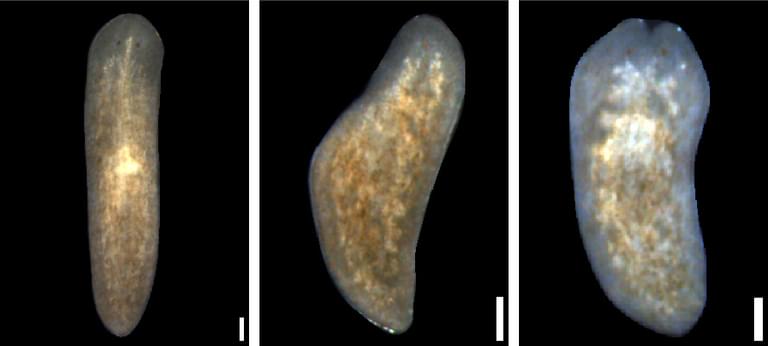News

09 May 2024
Heads or tails
New research identifies molecule involved in regulating the proportional scaling of planarian tissues during regeneration
Read Article
B.S., Molecular Biology and Chemistry, Vanderbilt University
Ph.D., Pharmacology and Cell Biophysics, University of Cincinnati College of Medicine

I envision a future in which our interrogation of nature will not only continue to unveil new biology, but will also result in the discovery of altogether new principles of biology.
Research Areas
Development and Regeneration, Genetics and Genomics, Evolutionary Biology, Molecular and Cell Biology
Courses Taught
Cell Biology; Evolution and Model Systems; Laboratory Rotation; Thesis Laboratory
Honors
2022
Priscilla Wood Neaves Chair in the Biomedical Sciences
2018
Member, National Academy of Sciences
2017
Member, Latin American Academy of Sciences
2015
Member, American Academy of Arts and Sciences
2009
National Institutes of Health, MERIT Award
2009
Ellison Medical Foundation Senior Scholar
2008
National Academy of Sciences Kavli Fellow
Alejandro Sánchez Alvarado, Ph.D., is the President and Chief Scientific Officer of the Stowers Institute. Alejandro joined the Institute in 2011, was named its Scientific Director in 2019, and named Executive Director and Chief Scientific Officer in 2021. In 2023 he was named President and Chief Scientific Officer.
Growing up in Caracas, Venezuela, Sánchez Alvarado moved from Venezuela to the United States to study molecular biology and chemistry at Vanderbilt University in Nashville, and then at the University of Cincinnati College of Medicine, where he earned his Ph.D. in pharmacology and cell biophysics. In 1994, he joined the laboratory of Donald D. Brown, M.D., in the department of embryology at the Carnegie Institution of Washington as a postdoctoral fellow. In 1995, he was appointed to the position of staff associate. It was during this period that Sánchez Alvarado developed his abiding interest in explaining the processes of regeneration.
Not satisfied with the available research organisms, he went looking for a better one, subsequently setting his sights on the planarian. On a trip to Barcelona with his first postdoctoral researcher, Phil Newmark, Ph.D., they collected a unique strain of the planaria Schmidtea mediterranea in an abandoned fountain. Sánchez Alvarado was able to subsequently establish the planaria as a modern research animal, studied by multiple other investigators. The Planarian Core in the Reptile and Aquatics Facility at the Stowers Institute now furnishes planaria to researchers and educators across the globe.
From 2002 to 2011, Sánchez Alvarado was a faculty member in the Department of Neurobiology and Anatomy at the University of Utah School of Medicine. In 2005, he was named an Investigator of the Howard Hughes Medical Institute (HHMI). Sánchez Alvarado is a member of the National Academy of Sciences and a lifetime fellow for the American Association for the advancement of Science (AAAS). He is a recipient of the Priscilla Wood Neaves Endowed Chair in the Biomedical Sciences.
Sánchez Alvarado speaks at conferences and seminars worldwide and serves on multiple local, regional and national boards, including the Nelson Atkins Museum of Art, Linda Hall Library and KCUR in Kansas City.
News

09 May 2024
New research identifies molecule involved in regulating the proportional scaling of planarian tissues during regeneration
Read Article
News
27 March 2024
The apple snail offers a way to study development and regeneration, providing insight to understand aspects of our own biology, and may one day help identify opportunities to induce regenerative capabilities in humans.
Read Article
News
13 December 2023
Planarian flatworms could unlock the secrets to how we may—someday in the future—regrow a damaged or missing limb or repair an organ, potentially transforming the lives of the generations to come.
Read Article
Hox genes regulate asexual reproductive behavior and tissue segmentation in adult animals
Arnold CP, Lozano AM, Mann FG, Jr., Nowotarski SH, Haug JO, Lange JJ, Seidel CW, Sánchez Alvarado A. Nat Commun. 2021;12:6706. doi: 6710.1038/s41467-41021-26986-41462.
Benham-Pyle BW, Brewster CE, Kent AM, Mann FG, Jr., Chen S, Scott AR, Box AC, Sánchez Alvarado A. Nat Cell Biol. 2021;23:939-952.
Changes in regeneration-responsive enhancers shape regenerative capacities in vertebrates
Wang W, Hu CK, Zeng A, Alegre D, Hu D, Gotting K, Ortega Granillo A, Wang Y, Robb S, Schnittker R, Zhang S, Alegre D, Li H, Ross E, Zhang N, Brunet A, Sanchez Alvarado A. Science. 2020;369: eaaz3090. doi: 10.1126/science.aaz3090.
Wnt and TGF-β coordinate growth and patterning to regulate size-dependent behavior
Arnold CP, Benham-Pyle BW, Lange JJ, Wood CJ, Sánchez Alvarado A. Nature. 2019;572:655-659.
Zeng A, Li H, Guo L, Gao X, McKinney S, Wang Y, Yu Z, Park J, Semerad C, Ross E, Cheng LC, Davies E, Lei K, Wang W, Perera A, Hall K, Peak A, Box A, Sánchez Alvarado A. Cell. 2018;173:1593-1608.e20.
Molecular characterization of a flatworm Girardia isolate from Guanajuato, Mexico
Duncan EM, Nowotarski SH, Guerrero-Hernandez C, Ross EJ, D'Orazio JA, Clubes de Ciencia Mexico Workshop for Developmental B. [published ahead of print June 17 2022]. Dev Biol 2022.
